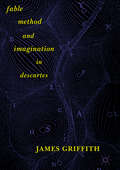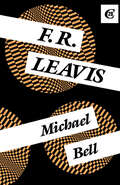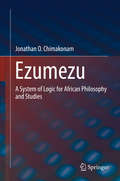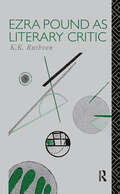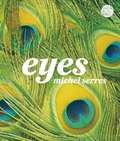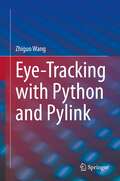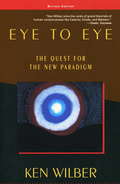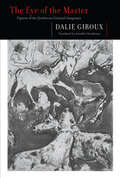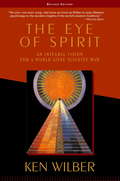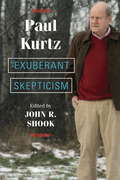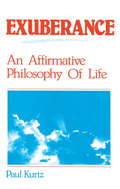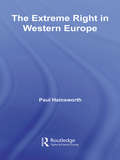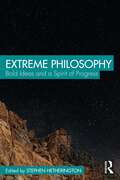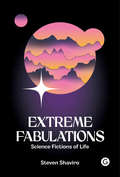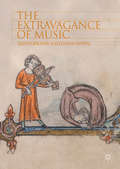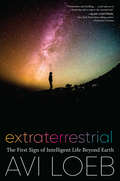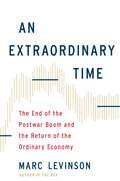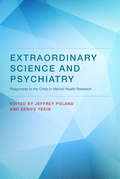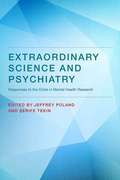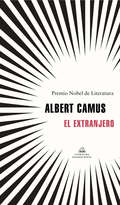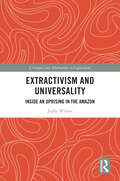- Table View
- List View
Fable, Method, and Imagination in Descartes
by James GriffithWhat role do fables play in Cartesian method and psychology? By looking at Descartes' use of fables, James Griffith suggests there is a fabular logic that runs to the heart of Descartes' philosophy. First focusing on The World and the Discourse on Method, this volume shows that by writing in fable form, Descartes allowed his readers to break from Scholastic methods of philosophizing. With this fable-structure or -logic in mind, the book reexamines the relationship between analysis, synthesis, and inexact sciences; between metaphysics and ethico-political life; and between the imagination, the will, and the passions.
F.R. Leavis (Critics of the Twentieth Century)
by Michael BellFirst published in 1988. Routledge is an imprint of Taylor & Francis, an informa company.
Ezumezu: A System of Logic for African Philosophy and Studies
by Jonathan O. ChimakonamThe issue of a logic foundation for African thought connects well with the question of method. Do we need new methods for African philosophy and studies? Or, are the methods of Western thought adequate for African intellectual space? These questions are not some of the easiest to answer because they lead straight to the question of whether or not a logic tradition from African intellectual space is possible. Thus in charting the course of future direction in African philosophy and studies, one must be confronted with this question of logic. The author boldly takes up this challenge and becomes the first to do so in a book by introducing new concepts and formulating a new African culture-inspired system of logic called Ezumezu which he believes would ground new methods in African philosophy and studies. He develops this system to rescue African philosophy and, by extension, sundry fields in African Indigenous Knowledge Systems from the spell of Plato and the hegemony of Aristotle. African philosophers can now ground their discourses in Ezumezu logic which will distinguish their philosophy as a tradition in its own right. On the whole, the book engages with some of the lingering controversies in the idea of (an) African logic before unveiling Ezumezu as a philosophy of logic, methodology and formal system. The book also provides fresh arguments and insights on the themes of decolonisation and Africanisation for the intellectual transformation of scholarship in Africa. It will appeal to philosophers and logicians—undergraduates and post graduate researchers—as well as those in various areas of African studies.
Ezra Pound as Literary Critic (Critics of the Twentieth Century)
by Emeritus Professor Ruthven K. K. RuthvenBringing some of the insights of modern critical theory to bear on a great deal of information about Pound's activities as a literary critic (some of it made available only recently), K.K. Ruthven provides a provocative re-reading of a major modernist writer who dominated the discourse of modernism.
Eyewitness to Power: The Essence of Leadership Nixon to Clinton
by David GergenFrom Nixon to Clinton, Watergate to Whitewater, few Americans have observed the ups and downs of presidential leadership more closely over the past thirty years than David Gergen. A White House adviser to four presidents, both Republican and Democrat, he offers a vivid, behind-the-scenes account of their struggles to exer- cise power and draws from them key lessons for leaders of the future. Gergen begins Eyewitness to Power with his reminiscence of being the thirty-year-old chief of the White House speechwriting team under Richard Nixon, a young man at the center of the Watergate storm. He analyzes what made Nixon strong-and then brought him crashing down: Why Nixon was the best global strategist among recent presidents. How others may gain his strategic sense. How Nixon allowed his presidency to spin out of control. Why the demons within destroyed him. What lessons there are in Nixon's disaster. Gergen recounts how President Ford recruited him to help shore up his White House as special counsel. Here Gergen considers: Why Ford is one of our most underrated presidents. Why his pardon of Nixon was right on the merits but was so mishandled that it cost him his presidency. Even in his brief tenure, Ford offers lessons of leadership for others, as Gergen explains. Though Gergen had worked in two campaigns against him, Ronald Reagan called him back to the White House again, where he served as the Gipper's first director of communications. Here he describes: How Reagan succeeded where others have failed. Why his temperament was more important than his intelligence. How he mastered relations with Congress and the press. The secrets of "the Great Communicator" and why his speeches were the most effective since those of John Kennedy and Franklin Roosevelt.
Eyes
by Michel Serres Anne-Marie Feenberg-Dibon'Eyes' is a masterful enactment of ways of seeing, thinking and knowing. This book addresses us to a world with a painterly eye, where the painting emits, transmits and emanates its own radiance. It poses the questions, what is it to see and to be seen: what if the world sees? How do we imagine eyes other than human eyes: what can insects, animals and seemingly inanimate objects see? How does this reconfiguration of seeing change our perception of the natural world and the human species?
Eye-Tracking with Python and Pylink
by Zhiguo WangSeveral Python programming books feature tools designed for experimental psychologists. What sets this book apart is its focus on eye-tracking.Eye-tracking is a widely used research technique in psychology and neuroscience labs. Research grade eye-trackers are typically faster, more accurate, and of course, more expensive than the ones seen in consumer goods or usability labs. Not surprisingly, a successful eye-tracking study usually requires sophisticated computer programming. Easy syntax and flexibility make Python a perfect choice for this task, especially for psychology researchers with little or no computer programming experience.This book offers detailed coverage of the Pylink library, a Python interface for the gold standard EyeLink ® eye-trackers, with many step-by-step example scripts. This book is a useful reference for eye-tracking researchers, but you can also use it as a textbook for graduate-level programming courses.
Eye to Eye: The Quest for the New Paradigm
by Ken WilberIn this book Wilber presents a model of consciousness that encompasses empirical, psychological, and spiritual modes of understanding. Wilber examines three realms of knowledge: the empirical realm of the senses, the rational realm of the mind, and the contemplative realm of the spirit. Eye to Eye points the way to a broader, more inclusive understanding of ourselves and the universe.
The Eye of the Sparrow
by Mark HowardEvery adult is the creation of a child. The Eye of the Sparrow is an adult novel about a child - a boy going off to summer camp. And it is a drama of spiritual liberation. Twelve-year-old David Ashton is trapped in the cynicism and negativity that have come to dominate man’s image of himself. He is convinced that he is destined to fail and that the instructors and students have it in for him. Yet his story becomes an intense struggle out of despair as, driven into the wilderness, David is compelled to face the destructive and creative power of his beliefs and the very meaning of life and death. . . A gripping, honest, and sometimes raw account of a boy’s painful inner struggle ... set against the backdrop of the wild and spirited beauty of the Okanagan.” — trish miller, BCLA Reporter
The Eye of the Master: Figures of the Québécois Colonial Imaginary (Carleton Library Series)
by Dalie GirouxIn the Québécois political vision of the twentieth century, sovereignty became synonymous with mastery. French Canadians sometimes claimed solidarity with racialized and Indigenous peoples, yet they saw their liberation as a matter of taking their rightful place in the seat of the oppressors. The idea of mastery has prevented the Québécois from seeing that their liberation is bound up with that of other groups oppressed by colonial powers. The Eye of the Master confronts the missed opportunities for a decolonial version of indépendance in Quebec by examining the quest for mastery that has been at the root of every version of independence offered to the people of Quebec since the mid-twentieth century. Exploring political discourse, popular culture, and the family photo album, Dalie Giroux revisits the mythology of being “masters in our own house” and identifies the obstacles blocking a more comprehensive version of liberation based on solidarity. Drawing from the living forces of Indigenous thought and anti-racist, ecological, and feminist movements, Giroux envisions life without conquest, domination, exploitation, and surveillance. Making the case for a different future, beginning in the here and now, The Eye of the Master offers a major new intervention in contemporary political thought to Canadian readers and all those who imagine a different North America.
The Eye of Spirit: An Integral Vision for a World Gone Slightly Mad
by Ken WilberIn this groundbreaking book, Ken Wilber uses his widely acknowledged "spectrum of consciousness" model to completely rewrite our approach to such important fields as psychology, spirituality, anthropology, cultural studies, art and literary theory, ecology, feminism, and planetary transformation. What would each of those fields look like if we wholeheartedly accepted the existence of not just body and mind but also soul and spirit? In a stunning display of integrative embrace, Wilber weaves these various fragments together into a coherent and compelling vision for the modern and postmodern world.
Exuberant Skepticism
by Paul KurtzFor more than three decades, philosopher Paul Kurtz has been a strong advocate of skepticism, not only as a philosophical position, but also as a fulfilling way of life. Contrary to the view that skepticism is merely a negative, nay saying, or debunking stance toward commonly held beliefs, skepticism as defined by Kurtz emerges reborn as "skeptical inquiry"--a decidedly positive philosophy ready and able to change the world. In this definitive collection, editor John R. Shook has gathered together seventeen of Paul Kurtz's most penetrating and insightful writings. Altogether these essays build an affirmative case for what can be known based on sound common sense, reason, and scientific method. And as each essay cogently and convincingly explains, so much can be known, from the natural world around us to the moral responsibilities among us. The work is organized in four topical sections. In the first, "Reasons to Be Skeptical," Kurtz presents compelling reasons why the methods of inquiry used by the sciences deserve respect. In short, science provides reliable knowledge, without which humanity would never have emerged from the age of myth and widespread ignorance. In the second section, "Skepticism and the Non-Natural," Kurtz shows how skeptical inquiry can be fruitfully used to critique both paranormal claims and religious worldviews. He also investigates whether science and religion can be compatible. In the third section, "Skepticism in the Human World," he considers how skeptical inquiry can be applied to politics, ethics, and pursuit of the good life. Realizing the essential connections between scientific knowledge, technological power, and social progress, Kurtz has understood, as few philosophers ever have, how the methods of intelligence can be applied to all areas of human endeavor. The book concludes with Kurtz's authoritative reflections on the skeptical movement that he founded and has led. As he explains, the forces of blind faith and stubborn unreason still fight for control of the mind, so the skeptic can never rest. If there is a brighter future for humanity, a future in which every person enjoys a realistic opportunity for the pursuit of excellence, Kurtz's 'exuberant skepticism' can show us the way.From the Trade Paperback edition.
Exuberant Skepticism
by Paul KurtzFor more than three decades, philosopher Paul Kurtz has been a strong advocate of skepticism, not only as a philosophical position, but also as a fulfilling way of life. Contrary to the view that skepticism is merely a negative, nay saying, or debunking stance toward commonly held beliefs, skepticism as defined by Kurtz emerges reborn as skeptical inquiry-a decidedly positive philosophy ready and able to change the world. In this definitive collection, editor John R. Shook has gathered together seventeen of Paul Kurtz's most penetrating and insightful writings. Altogether these essays build an affirmative case for what can be known based on sound common sense, reason, and scientific method. And as each essay cogently and convincingly explains, so much can be known, from the natural world around us to the moral responsibilities among us. The work is organized in four topical sections. In the first, Reasons to Be Skeptical, Kurtz presents compelling reasons why the methods of inquiry used by the sciences deserve respect. In short, science provides reliable knowledge, without which humanity would never have emerged from the age of myth and widespread ignorance. In the second section, Skepticism and the Non-Natural, Kurtz shows how skeptical inquiry can be fruitfully used to critique both paranormal claims and religious worldviews. He also investigates whether science and religion can be compatible. In the third section, Skepticism in the Human World, he considers how skeptical inquiry can be applied to politics, ethics, and pursuit of the good life. Realizing the essential connections between scientific knowledge, technological power, and social progress, Kurtz has understood, as few other philosophers ever have, how the methods of intelligence can be applied to all areas of human endeavor. The volume concludes with Kurtz's authoritative reflections on the skeptical movement that he founded and has led. As he never tires of explaining, the forces of blind faith and stubborn unreason still fight for control of the mind, so the skeptic can never rest. If there is a brighter future for humanity, a future in which every person enjoys a realistic opportunity for the pursuit of excellence, Kurtz's exuberant skepticism can show us the way. Paul Kurtz, professor emeritus of philosophy at the State University of New York at Buffalo and a fellow of the American Association for the Advancement of Science, is the author or editor of more than fifty books, including The Transcendental Temptation, The Courage to Become, Embracing the Power of Humanism, plus nine hundred articles and reviews. He is the founder of the Center for Inquiry/Transnational, the Council for Secular Humanism, and the Committee for Skeptical Inquiry. He has appeared on many major TV and radio talk shows, and has lectured at universities worldwide. John R. Shook (Amherst, NY) is vice president for education and research and a senior research fellow at the Center for Inquiry Transnational, in Amherst, New York. He is the author of Dewey's Empirical Theory of Knowledge and Reality. He is the editor of Pragmatic Naturalism and Realism and, with Hugh McDonald, of F. C. S. Schiller on Pragmatism and Humanism: Selected Writings, 1891-1939, among other works.
Exuberance: An Affirmative Philosophy of Life
by Paul KurtzHappiness is within everyone's grasp and is only a matter of making the right choices. Taking destiny into one's own hands and having the creative audacity to strive, seek, and meet challenges is the essence of life's drama and exaltation. Life per se has no meaning; it only presents opportunity to be seized and acted upon, thus paving the way for personal achievement and the full life. Paul Kurtz, in Exuberance, shows his readers how to banish drudgery from life and how to find happiness in the active life. Drawing upon his personal experience, knowledge, and success, Paul Kurtz explains his philosophy of life, discussing learning and work, pleasure, eroticism and sexuality, morality, the need for love and friendship, and participation in contemporary issues. He suggests that self-power, resourcefulness, daring, creativity, and intelligence help guide and control one's life in spite of the many obstacles along the way. Only the individual can initiate his own success and therefore can take pride in accomplishing what he sets out to do. Exuberance also shows the reader how to cope with an ambiguous world. Life is charged with unexpected events and bizarre happenings. It is filled with richly diverse and idiosyncratic characters. Constant effort and exertion is needed in making a living, meeting new friends, falling in love, raising children, seeing projects through, and coming to terms with old age and death. Dealing with these problems directly rather than fleeing from life's risks reinforces a person and leads him towards an exuberant, rich, zestful life. According to Dr. Kurtz, the fulfillment of one's own purpose is in creating one's own ends and expending the power and energy to attain them. Thus, life's great sin, he suggests, is being lazy and non-creative. It is the kind of book that many people will wish they had written and almost everybody will be glad to read. -ReasonPaul Kurtz (Amherst, NY), professor emeritus of philosophy at the State University of New York at Buffalo, is president of the International Academy of Humanism and is one of the leading spokespersons for Secular Humanism today. He is the author or editor of over thirty-five books, including Embracing the Power of Humanism (Rowman & Littlefield) and The Courage to Become (Praeger/Greenwood).
Extremism: A Philosophical Analysis
by Quassim CassamExtremism is one of the most charged and controversial issues of the twenty-first century. Despite myriad programs of deradicalization and prevention around the world, it remains an intractable and poorly understood problem. Yet it is also sometimes regarded as a positive force – according to Martin Luther King Jr., 'the question is not whether we will be extremists, but what kind of extremists we will be'. In this much-needed and lucid book, Quassim Cassam identifies three types of extremism – ideological; methods; and psychological extremism – and discusses the following fundamental topics and issues: What is extremism? What are the methods adopted by extremists? Is there an extremist ‘mindset’ and if so, what is it? What role do ideas of purity, victimhood and humiliation play in understanding extremism? How does extremism differ from fanaticism and fundamentalism? How does one become an extremist and how should we understand deradicalization? Throughout the book, Quassim Cassam uses many compelling examples, ranging from the Khmer Rouge, the IRA, Al-Qaeda and Timothy McVeigh to Philip Roth’s novel American Pastoral and counter-extremism programmes, including the UK’s Prevent strategy. Clear-headed and engaging, Extremism: A Philosophical Analysis is essential reading for anyone interested in this important topic, not only in Philosophy but related disciplines such as Politics and International Relations, Conflict and Terrorism Studies, Law, Education and Religion. It will also be of great interest to policy-makers and those engaged in understanding extremism at any level.
The Extreme Right in Europe
by Paul HainsworthThe Extreme Right in Western Europe is a concise introduction to one of the most persistent facets of late twentieth-century history, politics and society. The legacy of the Nazi era and the increasingly unacceptable face of extremism all militated against the success of far right-wing parties after World War Two. Nevertheless, contemporary problems and the solutions offered to ever more difficult questions such as immigration, unemployment, and law and order have enabled extremist, nationalist and populist movements to emerge. Focusing on a range of countries including France, Italy, Germany, the UK, Austria, Belgium and the Mediterranean region, Paul Hainsworth: explores the concept of right-wing extremism discusses the varying success of extreme right political parties in Western Europe examines the policies and perspectives of these parties analyses the profile of the extreme right’s electorate assesses the impact of right-wing extremism on aspects of politics in contemporary Western Europe. This accessible and up-to-date analysis of this enduring movement in Western Europe is a must for courses in history, politics and European studies.
Extreme Philosophy: Bold Ideas and a Spirit of Progress
by Stephen HetheringtonPhilosophy’s value and power are greatly diminished when it operates within a too closely confined professional space. Extreme Philosophy: Bold Ideas and a Spirit of Progress serves as an antidote to the increasing narrowness of the field. It offers readers–including students and general readers–twenty internationally acclaimed philosophers who highlight and defend odd, extreme, or ‘mad’ ideas. The resulting conjectures are often provocative and bold, but always clear and accessible.Ideas discussed in the book, include: propaganda need not be irrational science need not be rational extremism need not be bad tax evasion need not be immoral anarchy need not be uninviting democracy need not remain as it generally is humans might have immaterial souls human minds might have all-but-unlimited powers knowing might be nothing beyond being correct space and time might not be ‘out there’ in reality value might be the foundational part of reality value might differ in an infinitely repeating reality reality is One reality is vague In brief, the volume pursues adventures in philosophy. This spirit of philosophical risk-taking and openness to new, ‘large’ ideas were vital to philosophy’s ancient origins, and they may also be fertile ground today for philosophical progress.
Extreme Fabulations: Science Fictions of Life
by Steven ShaviroAn examination of science fiction narratives and the light they shed on human life, the unknowable future, and the vagaries of unforeseeable change.With this book, Steven Shaviro offers a thought experiment. He discusses a number of science fiction narratives: three novels, one novella, three short stories, and one musical concept album. Shaviro not only analyzes these works in detail but also uses them to ask questions about human, and more generally, biological life: about its stubborn insistence and yet fragility; about the possibilities and perils of seeking to control it; about the aesthetic and social dimensions of human existence, in relation to the nonhuman; and about the ethical value of human life under conditions of extreme oppression and devastation. Shaviro pursues these questions through the medium of science fiction because this form of storytelling offers us a unique way of grappling with issues that deeply and unavoidably concern us but that are intractable to rational argumentation or to empirical verification. The future is unavoidably vague and multifarious; it stubbornly resists our efforts to know it in advance, let alone to guide it or circumscribe it. But science fiction takes up this very vagueness and indeterminacy and renders it into the form of a self-consciously fictional narrative. It gives us characters who experience, and respond to, the vagaries of unforeseeable change.
The Extravagance of Music
by David Brown Gavin HoppsThis book explores the ways in which music can engender religious experience, by virtue of its ability to evoke the ineffable and affect how the world is open to us. Arguing against approaches that limit the religious significance of music to an illustrative function, The Extravagance of Music sets out a more expansive and optimistic vision, which suggests that there is an ‘excess’ or ‘extravagance’ in both music and the divine that can open up revelatory and transformative possibilities. In Part I, David Brown argues that even in the absence of words, classical instrumental music can disclose something of the divine nature that allows us to speak of an experience analogous to contemplative prayer. In Part II, Gavin Hopps contends that, far from being a wasteland of mind-closing triviality, popular music frequently aspires to elicit the imaginative engagement of the listener and is capable of evoking intimations of transcendence. Filled with fresh and accessible discussions of diverse examples and forms of music, this ground-breaking book affirms the disclosive and affective capacities of music, and shows how it can help to awaken, vivify, and sustain a sense of the divine in everyday life.
Extraterrestrial: The First Sign of Intelligent Life Beyond Earth
by Avi LoebHarvard’s top astronomer lays out his controversial theory that our solar system was recently visited by advanced alien technology from a distant star. In late 2017, scientists at a Hawaiian observatory glimpsed an object soaring through our inner solar system, moving so quickly that it could only have come from another star. Avi Loeb, Harvard’s top astronomer, showed it was not an asteroid; it was moving too fast along a strange orbit, and left no trail of gas or debris in its wake. There was only one conceivable explanation: the object was a piece of advanced technology created by a distant alien civilization. In Extraterrestrial, Loeb takes readers inside the thrilling story of the first interstellar visitor to be spotted in our solar system. He outlines his controversial theory and its profound implications: for science, for religion, and for the future of our species and our planet. A mind-bending journey through the furthest reaches of science, space-time, and the human imagination, Extraterrestrial challenges readers to aim for the stars—and to think critically about what’s out there, no matter how strange it seems. <P><P> <b>A New York Times Bestseller</b>
An Extraordinary Time: The End of the Postwar Boom and the Return of the Ordinary Economy
by Marc LevinsonThe decades after World War II were a golden age across much of the world. It was a time of economic miracles, an era when steady jobs were easy to find and families could see their living standards improving year after year. And then, around 1973, the good times vanished. The world economy slumped badly, then settled into the slow, erratic growth that had been the norm before the war. The result was an era of anxiety, uncertainty, and political extremism that we are still grappling with today.In An Extraordinary Time, acclaimed economic historian Marc Levinson describes how the end of the postwar boom reverberated throughout the global economy, bringing energy shortages, financial crises, soaring unemployment, and a gnawing sense of insecurity. Politicians, suddenly unable to deliver the prosperity of years past, railed haplessly against currency speculators, oil sheikhs, and other forces they could not control. From Sweden to Southern California, citizens grew suspicious of their newly ineffective governments and rebelled against the high taxes needed to support social welfare programs enacted when coffers were flush.Almost everywhere, the pendulum swung to the right, bringing politicians like Margaret Thatcher and Ronald Reagan to power. But their promise that deregulation, privatization, lower tax rates, and smaller government would restore economic security and robust growth proved unfounded. Although the guiding hand of the state could no longer deliver the steady economic performance the public had come to expect, free-market policies were equally unable to do so. The golden age would not come back again.A sweeping reappraisal of the last sixty years of world history, An Extraordinary Time forces us to come to terms with how little control we actually have over the economy.
Extraordinary Science and Psychiatry: Responses to the Crisis in Mental Health Research (Philosophical Psychopathology)
by Jeffrey Poland Şerife TekinLeading scholars offer perspectives from the philosophy of science on the crisis in psychiatric research that exploded after the publication of DSM-5.Psychiatry and mental health research is in crisis, with tensions between psychiatry's clinical and research aims and controversies over diagnosis, treatment, and scientific constructs for studying mental disorders. At the center of these controversies is the Diagnostic and Statistical Manual of Mental Disorders (DSM), which—especially after the publication of DSM-5—many have found seriously flawed as a guide for research. This book addresses the crisis and the associated “extraordinary science” (Thomas Kuhn's term for scientific research during a state of crisis) from the perspective of philosophy of science. The goal is to help reconcile the competing claims of science and phenomenology within psychiatry and to offer new insights for the philosophy of science. The contributors discuss the epistemological origins of the current crisis, the nature of evidence in psychiatric research, and the National Institute for Mental Health's Research Domain Criteria project. They consider particular research practices in psychiatry—computational, personalized, mechanistic, and user-led—and the specific categories of schizophrenia, depressive disorder, and bipolar disorder. Finally, they examine the DSM's dubious practice of pathologizing normality.ContributorsRichard P. Bentall, John Bickle, Robyn Bluhm, Rachel Cooper, Kelso Cratsley, Owen Flanagan, Michael Frank, George Graham, Ginger A. Hoffman, Harold Kincaid, Aaron Kostko, Edouard Machery, Jeffrey Poland, Claire Pouncey, Şerife Tekin, Peter Zachar
Extraordinary Science and Psychiatry: Responses to the Crisis in Mental Health Research
by Jeffrey Poland Serife TekinPsychiatry and mental health research is in crisis, with tensions between psychiatry's clinical and research aims and controversies over diagnosis, treatment, and scientific constructs for studying mental disorders. At the center of these controversies is the Diagnostic and Statistical Manual of Mental Disorders (DSM), which -- especially after the publication of DSM-5 -- many have found seriously flawed as a guide for research. This book addresses the crisis and the associated "extraordinary science" (Thomas Kuhn's term for scientific research during a state of crisis) from the perspective of philosophy of science. The goal is to help reconcile the competing claims of science and phenomenology within psychiatry and to offer new insights for the philosophy of science. The contributors discuss the epistemological origins of the current crisis, the nature of evidence in psychiatric research, and the National Institute for Mental Health's Research Domain Criteria project. They consider particular research practices in psychiatry -- computational, personalized, mechanistic, and user-led -- and the specific categories of schizophrenia, depressive disorder, and bipolar disorder. Finally, they examine the DSM's dubious practice of pathologizing normality.ContributorsRichard P. Bentall, John Bickle, Robyn Bluhm, Rachel Cooper, Kelso Cratsley, Owen Flanagan, Michael Frank, George Graham, Ginger A. Hoffman, Harold Kincaid, Aaron Kostko, Edouard Machery, Jeffrey Poland, Claire Pouncey, Serife Tekin, Peter Zachar
El extranjero
by Albert Camus«Mamá se ha muerto hoy. O puede que ayer, no lo sé.» Publicada originalmente en 1942, El extranjero es la primera novela de Albert Camus y una de sus obras más emblemáticas. Ahora con nueva traducción al español de María Teresa Gallego Urrutia y Amaya García Gallego, este libro capital para la cultura del siglo XX transcurre en Argelia y narra la anodina vida de Meursault, un joven oficinista que vive en perpetua apatía. Cuando recibe la noticia del fallecimiento de su madre, la encaja con la mayor impasibilidad. Obligado a abandonar la capital y viajar para asistir al funeral, Meursault desea que la ceremonia sea breve para regresar a su casa. Esa indiferencia existencial marca sus días, avanzando sin reaccionar a la muerte de su madre, al afecto de su amada y ni tan siquiera a un crimen que cometerá con idéntica desidia, incapaz de ver el alcance moral de sus actos. Camus retrata magistralmente la indolencia del hombre del siglo XX, un hombre que no encuentra su lugar, extranjero en su propio mundo. Este personaje escéptico y desapasionado que ha abandonado su condición de sujeto autónomo sigue siendo hoy un imprescindible referente literario y existencial.
Extractivism and Universality: Inside an Uprising in the Amazon (Critiques and Alternatives to Capitalism)
by Japhy WilsonExtractivism and Universality tells the inside story of a spontaneous uprising in the Ecuadorian Amazon in 2017, in which mestizo, Black and Indigenous workers and communities confronted the combined forces of a multinational oil company and a militarized state. It documents a rapidly evolving battle that achieved a remarkable victory, and captures the flourishing of an insurgent form of political universality in which racial, ethnic, and cultural divisions were suddenly and powerfully overcome. Intervening in debates on the resistances and alternatives developed by the inhabitants of resource extraction zones, the book takes the reader deep inside a rebellion on an Amazonian oil frontier and offers a unique insight into insurgent universality in the lived reality of its material existence. It argues that the dominant decolonial dichotomy between Eurocentric universalism and an Indigenous pluriverse should be replaced by an approach that is attentive to manifestations of universality performed by diverse subaltern subjects. And it does so through a fast-paced fusion of radical political theory with the raw first-person style of gonzo journalism. It will appeal to scholars and students across the social sciences with interests in political and social theory, social movements, labour relations, and the political ecology of extractivism.
